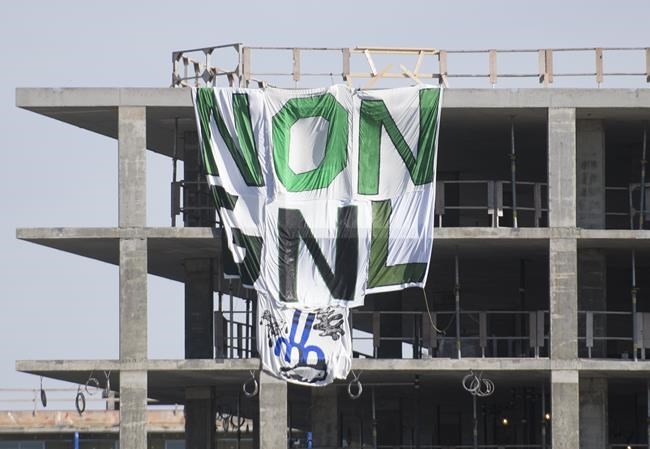MONTREAL — There won't be any more negotiations over a proposed natural gas pipeline crossing Indigenous lands in northern Quebec, say Innu leaders who oppose it.
The Innu First Nations of Mashteuiatsh, Pessamit and Essipit say they are ready to take measures — even legal action — to stop GNL Quebec's Énergie Saguenay project from being built on their territories.
The statement released on Friday was a response to comments from GNL Quebec president Tony Le Verger, who said last weekendhe wanted to continue negotiations with the Indigenous communities.
Charles-Edouard Verreault, vice-chief of Mashteuiatsh First Nation and spokesman for the three Innu First Nations, said in an interview on Friday that GNL Quebec won't receive their consent.
The Innu First Nations had previously expressed opposition to the multibillion-dollar plan in May, following the publication of Quebec's environmental review board report on the project.
"We listened, we did our own researches on the project, and following the conclusions of the BAPE report, it is clear that our position will remain the same," Verreault said. "This project won't be happening on our territories."
The 500-page BAPE report, by the Bureau d'audiences publiques sur l'environnement, said the benefits from the 750-kilometre-long gas pipeline would not outweigh the environmental costs associated with it. The project's review drew the greatest response to any BAPE report with more than 2,500 briefs presented, 91 per cent of which were against the idea.
"As mentioned in the report, GNL Quebec has no way of ensuring that liquefied natural gas would effectively serve as a substitute to polluting fuels already used in targeted export markets," Verreault said. "It's impossible for the company to meet its commitment in terms of reducing greenhouse gases."
GNL Quebec spokesman Louis-Martin Leclerc said in an interview the company remains open to negotiations with the communities in order to explain the project's benefits.
"We are and remain open to dialogue in order to have the opportunity to explain our commitments and demonstrate that the Énergie Saguenay project will provide liquefied natural gas with the lowest carbon footprint in the world, thus making an important contribution to the fight against climate change," said Leclerc.
The Énergie Saguenay project was first introduced to the Indigenous communities in 2014 as a measure to fight climate change, Verreault said.
The proposed route would carry liquefied natural gas from Western Canada to a liquefaction plant in Port Saguenay, Que. However, Verreault said the route would cross Indigenous lands.
For the Innu First Nations, accepting a project that could pose environmental threats would go against ancestral values, he said.
"This territory is where our ancestors have been settled for centuries and where we hold ancestral rights and Innu titles," Verreault said.
The Innu First Nations ancestral rights, however, have yet to be officially recognized by the Quebec government.
Quebec's Indigenous Affairs Minister Ian Lafreniere said on Friday he was aware of the Innu position but was awaiting Environment Minister Benoit Charette's decision on the project.
Quebec's government said in April it would make a decision on whether to give the project the green light by the end of the summer.
"All the options are on the table, in terms of the actions we could take (to stop the project) if the government goes ahead with it," Verreault said.
"There is no way that GNL Quebec sees the light of the day on the Innu territory."
This report by The Canadian Press was first published on July 17, 2021.
Virginie Ann, The Canadian Press



